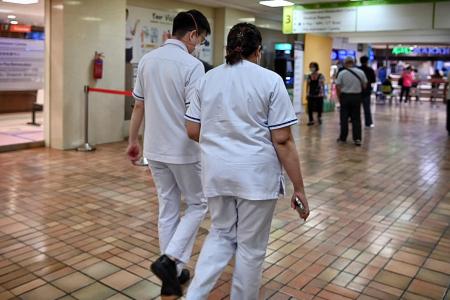Healthcare workers 'grapple with fatigue' as cases rise in Singapore
Heavier workload and manpower shortage increase strain as Covid cases hit thousands, but new health measures may provide respite
More patients to tend to, working overtime and recalled for duty on days off, no time for toilet breaks, exhaustion and feeling burnt out.
This is what many healthcare workers in hospitals have been going through since Covid-19 cases rose to the thousands daily from mid-September.
For nurse Anne (not her real name), the number of infected patients she has to monitor in a Covid-19 ward of a SingHealth hospital has doubled.
In July and early August, the 24-year-old and her colleague took care of six patients at any one time. Now, they look after 12.
"We don't even have time to go on breaks. I would just push through and sometimes don't even use the toilet," she said.
Like Anne, the healthcare workers The Straits Times spoke to declined to reveal their names - and, in some cases, the hospitals they work in - because of work policies.
The manpower shortage in the sector has also been compounded by quarantine orders. Senior Minister of State for Health Janil Puthucheary told Parliament on Oct 4 that close to 400 healthcare workers have tested positive for Covid-19.
MORE THAN HALF
Cathy, a former cardiac technologist at Tan Tock Seng Hospital (TTSH), said: "When someone is suspected to have contracted Covid-19, it means that more than half the department would have to be down for quarantine."
However, new health measures announced last Saturday may provide some respite for healthcare workers, as quarantine orders have been replaced with antigen rapid tests. Those who receive health risk warnings should self-isolate and take an ART. They can continue with normal activities if they test negative, but must continue taking an ART daily for the next week.
The home recovery scheme was also expanded to more groups, including vaccinated people aged 70 to 79. But it will take a while for the hospital load to ease as there were 1,613 cases warded as at Sunday.
Nurse Belinda, who is in her 20s and works in an isolation ward for suspected cases in TTSH, said: "The physical work is more taxing now... The patients are weaker and sicker, and their care plans are more complex."
TTSH chief nurse Hoi Shu Yin said since the hospital has battled three to four waves of infections over close to two years - from the dorm outbreak last year, the hospital cluster in April, and the ongoing wave - the nurses are grappling with "a certain level of fatigue".
"They say, 'Can we have more nurses?'...They look and sound tired, and some will be sharing how much they miss their families."
Hospitals have been asked to postpone less urgent operations and appointments to prioritise resources for Covid-19 patients.
But Dr Francis, a junior doctor in a public hospital, said: "I worry for doctors - that this backlog of elective surgeries is going to create a surge in surgical load once this wave is over."
As part of managing the manpower constraints, about 900 individuals - including nurses not in active practice - have stepped forward to help, the Ministry of Health said last week. They are being progressively referred to the public hospitals.
Get The New Paper on your phone with the free TNP app. Download from the Apple App Store or Google Play Store now


